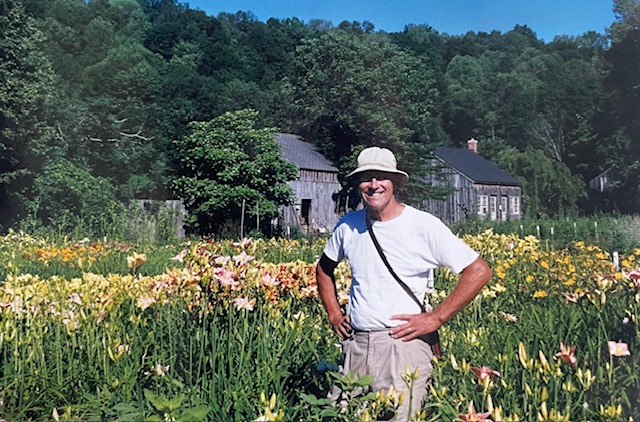Melvin Lee Bristol, 1936-2023

July 7, 2023
CT NOFA is sad to announce the passing of Melvin Lee Bristol. Mel was one of CT NOFA’s earliest supporters and a close friend to our founder, Bill Duesing. Mel’s obituary follows.
Melvin Lee Bristol, 1936-2023
On Saturday June 10th, 2023, Mel Bristol passed away at the age of 86. Until recently he resided at his beloved Bloomingfields Farm, where he had lived and worked since 1970. Mel is survived by his wife of 40 years, Diana Knapp Bristol; his three children Ann Crawford, Ben Bristol and Peter Bristol; his two stepchildren Hannah Knapp and Jeremy Knapp; his seven grand-children: Jennifer, Justin, Bellamie, Emery, Elena, Alice, and Owen; and the two children of his late sister Irene Bristol Allen: Mark and Jennifer.
Mel was an active member of the Northeast Organic Farmers Association and brought the spirit of agrarianism to everything he did. He had a strong connection to the land. He believed in doing things in the old ways and being a good shepherd of his small farm. He loved to share his rich experiences with the local terrain and waterways. He nurtured plants, food, soil, and his flocks. By doing so, Mel helped to build a local movement in Connecticut about rethinking our relationship with the land, our farms, and our communities.
The son of Herman and Merle Bristol, Melvin Lee Bristol was born and raised in Collinsville, Connecticut. In addition to running a tree farm, his father worked for the Collins [Axe] Company, through which the family established ties with a number of salesmen and friends in South America. These connections in turn led directly to a formative year abroad for Mel in Sao Paulo, Brazil at the age of 14, which he often reflected on as a life-changing event that put him on a new trajectory as an explorer and naturalist. After returning from Brazil, Mel finished high school at Northfield Mount Hermon, became an Eagle Scout, and then went on to Harvard. As an undergraduate, his prior international experience in Brazil combined with his budding scientific interests earned him a coveted spot on an 18-month Harvard/Yale bird research expedition to India, Pakistan, Nepal and Bangladesh which was sponsored by the luminary ornithologist S. Dillon Ripley and led by Ray Paynter. Subsequently, Mel studied with Richard Schultes, author of The Plants of the Gods and a professor at Harvard who is widely considered the father of modern ethnobotany. Under Schultes’ guidance Mel completed his PhD in Ethnobotany. His studies and dissertation focused primarily on the medicinal and shamanistic uses of certain plants by the Kamsá people of the Sibundoy Valley in Colombia, which have been published in the Botanical Museum Leaflets of Harvard University.
Just prior to leaving for Cuba for a summer of botanical research in 1959, Mel met Josephine Hart. They were soon married and starting a family, and lived in Cambridge, Colombia, Samoa, and Hawaii before eventually returning to Connecticut ten years later. During this period, Mel conducted sponsored research on the medicinal properties of plants and worked as a Professor of Botany at the University of Hawaii, in Honolulu.
In 1969 the family settled down in Sherman, Connecticut, where Mel set out to reclaim his agrarian roots and embrace the homesteading zeitgeist. With Josephine and her parents, Mel acquired 25 acres of fertile ground in northern Sherman and initiated the work of building a house and barns and tilling the fields. His family grew, crops were experimented with, a landscaping business came and went, and a new focus on daylilies and organic markets emerged.
Around 1980, a local architect introduced Mel to Diana Knapp and their relationship quickly solidified. With Diana, her children Hannah and Jeremy joined the family and farm. Together, Mel and Diana honed a singular vision for their home, meadows, sheep, chickens, daylilies and kitchen gardens; and in so doing they helped to inspire a new generation of young farmers in Connecticut, with their focus on maintaining a small and balanced homestead and farming in harmony with the surrounding land and ecosystem. Together, Mel and Diana became leaders of and contributors to the New Milford Farmers Market, the Northeast Organic Farmers Association, the Saugerties Garlic Festival, and the conservation efforts of the Naromi Land Trust, the Audubon Society, and more.
At Bloomingfields Farm, Mel worked diligently to keep the old methods of farming alive. He embraced non-electric, non-mechanized methods as much as possible in the way of the Amish. He built a well-sweep with a stone counterbalance in the manner used for thousands of years in the Middle East. He cultivated a “living fence” in the farm’s East Pasture, made of cedar trees. Some years, he even scythed and raked acres upon acres of fields with his daylily workers.
When not working on the farm, Mel loved to spend time with family and friends exploring the waterways and terrain of the Hudson Valley, the Adirondacks, and Northwestern Connecticut. Mel was most in his element while in his canoe, paddling through marshes and other backwaters; while on cross-country skis, traversing the windswept cornfields of Dutchess County; while in his boots, ambling through the hill-country of Litchfield County and beyond; or while sauntering around Bulls Bridge in Kent with his trusty hand-carved walking stick in hand, which he would use to point out the slow march of walking ferns through the landscape, or any other such botanical curiosities to a lucky companion or passerby.
In lieu of flowers, please consider a donation in Mel’s memory to either the Naromi Land Trust (Northwest Connecticut Land Conservancy) or the Seed Savers Exchange.
Recent Posts
Support the CT Environmental Rights Amendment Public Hearing
This is the time to make your voice heard at the CT General Assembly in support of the CT Environmental Rights Amendment! The public hearing is when the legislators are most likely to be listening to and reading what you have to say, and then what you say goes into the public record!
Read MoreBulk Order NOFA Membership Discounts
The Bulk Order, in its previous format, is no longer taking place. The legacy of the Bulk Order continues – not as a one-time order event, but as an ongoing member benefit that supports growers, and grows over time as we add more vendors and wholesale-level access.
For 2026, we are connecting members to quality organic growing supplies with a direct-to-consumer purchasing option through our program partners: Progressive Grower and Fedco Seeds.
Read More

